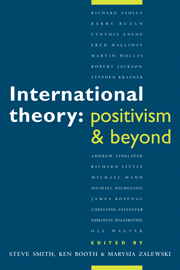Book contents
- Frontmatter
- Contents
- List of contributors
- Preface and acknowledgements
- Introduction
- I Debates
- II Legacies
- III Silences
- IV Openings
- 10 Authoritarian and liberal militarism: a contribution from comparative and historical sociology
- 11 The achievements of post-structuralism
- 12 The contributions of feminist theory to international relations
- 13 The achievements of critical theory
- V Directions
- Index
11 - The achievements of post-structuralism
Published online by Cambridge University Press: 09 March 2010
- Frontmatter
- Contents
- List of contributors
- Preface and acknowledgements
- Introduction
- I Debates
- II Legacies
- III Silences
- IV Openings
- 10 Authoritarian and liberal militarism: a contribution from comparative and historical sociology
- 11 The achievements of post-structuralism
- 12 The contributions of feminist theory to international relations
- 13 The achievements of critical theory
- V Directions
- Index
Summary
A single sentence, interjected by a colleague into one of my more rambling attempts to make a point in the course of a discussion a few months back: ‘You boys in IR,’ my colleague exclaimed, arching her eyebrows chidingly upon inflecting the second of these words, ‘you boys always talk as if you're out there on the plains somewhere, on horseback, galloping alone.’ The comment, accompanied by my colleague's pantomiming of a rider gripping reins and by her own sound effects suggestive of racing hoofbeats, might have been immediately prompted by my own conversational turns. It was clear, though, that she was having her fun, not just with my words, but with the entire field of international relations. My colleague was conveying some sense of amusement at, if not exasperation with, the tendency of conversations among ‘the IR boys’ to hightail it across the surfaces of historical experience, a stranger to every place, seldom pausing to dismount and explore any locale, eschewing all commitments, always moving as if chasing some fast-retreating end or fleeing just ahead of the grasp of some relentless pursuer.
The very language of ‘the IR boys'’ conversation, I learned from my colleague, seemed to her to be preoccupied with questions of strategy. Yet it also seemed to her to be especially austere and abstract, as if designed both to dispense with the encumbering weight of historically sedimented meanings and to permit the most rapid redeployment of available terms to new circumstances.
- Type
- Chapter
- Information
- International TheoryPositivism and Beyond, pp. 240 - 253Publisher: Cambridge University PressPrint publication year: 1996
- 15
- Cited by

